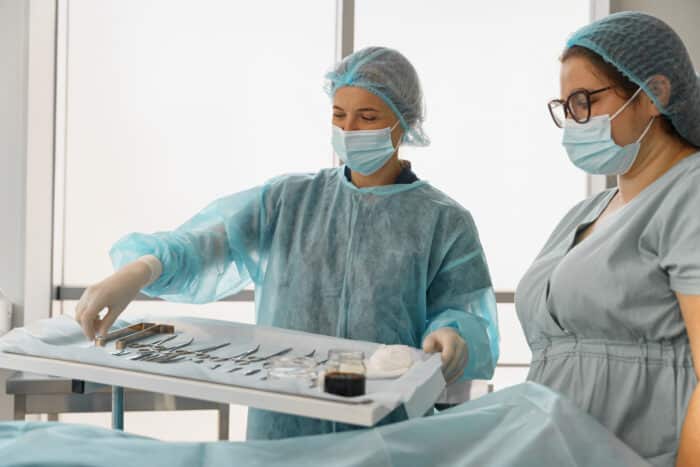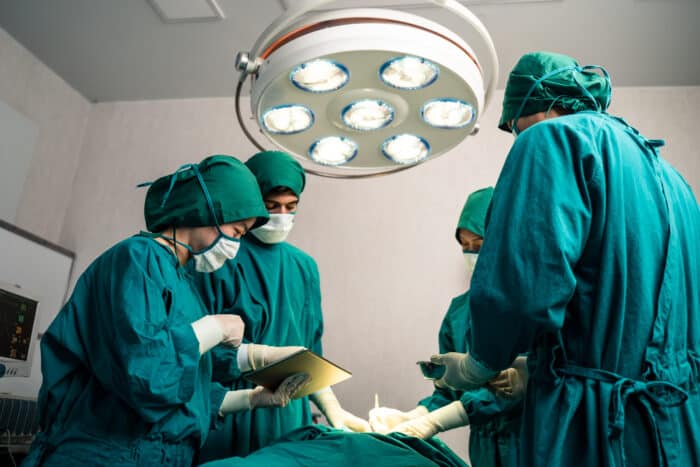If you aspire to step into the world of surgical technology and be part of life-changing medical procedures then becoming a Surgical Tech is just for you.
Surgical techs play a big role in the medical world. They are the helping hand in surgery, making sure everything goes well. To do their job right, they need some important tools, and in this article, we’re going to explore them.
These instruments are the unsung heroes of the surgical world, silently helping the surgical team in their quest to heal and save our lives.
Let’s Start –
Categories of Instruments Used by Surgical Tech
In the world of surgery, precision is paramount, and surgical techs rely on specialized instruments to assist the surgical team in surgical procedures.
For ease of understanding, we have divided the instruments into 3 categories based on their functions and the different phases of a surgical procedure –
- Pre-Operative Instruments
- Operative Instruments
- Post-Operative Instruments
Before we delve deeper, you should understand that the instruments that we mentioned are a complete list but are the ones you’ll be using frequently, or mostly.
Read:
-> What Does a Surgical Tech Do?
Pre-Operative Instruments
Before surgery begins, pre-operative instruments set the stage for a sterile and well-prepared environment. Here are the most common instruments –
Scalpel: A small, sharp knife used for making incisions in the patient’s skin. It’s the starting point for many surgeries.
Scissors: Surgical scissors come in various shapes and sizes, each tailored for specific tasks like cutting tissues or sutures.
Forceps: These tweezers-like instruments are used for grasping and holding tissues, vessels, or other objects during surgery.
Needle Holder: Designed to hold needles firmly while suturing tissues together.
Operative Instruments
During the surgery itself, operative instruments come into play, aiding surgeons in performing the procedure effectively. Here are the most common instruments –
Surgical Drapes: These sterile coverings are used to create a sterile field around the surgical site, preventing contamination.
Surgical Suction Devices: They help remove blood and fluids from the surgical area, ensuring visibility for the surgeon.
Retractors: Instruments used to hold back tissues, exposing the surgical field for the surgeon to work.
Electrocautery Devices: Used to cut or coagulate tissues and vessels by applying electrical current.
Post-Operative Instruments
After the surgery, post-operative instruments are instrumental in wound care and patient recovery. Here are the most common instruments –
Surgical Dressings: Used to cover incisions and wounds after surgery, aiding in the healing process.
Surgical Staples and Sutures: These are essential for closing incisions and wounds, and promoting healing.
Hemostats: Used to control bleeding by clamping blood vessels or tissues.
Sterilization Equipment: Vital for cleaning and sterilizing instruments for future use.
Read:
-> Is Surgical Tech School Hard?
-> How to Become a Surgical Tech?
Common Instruments Used by Surgical Techs
These instruments play a crucial role in ensuring surgical procedures are conducted safely and efficiently, helping the surgical team provide optimal care to patients. You should know your way around these tools since it is super important.
Read More:
-> Online Surgical Tech Programs
-> Surgical Tech Classes & Courses
-> Surgical Tech Program & Training
Let’s explore the surgical instruments besides the above-mentioned ones–
Kocher Forceps
These are strong, toothed instruments used to clamp blood vessels or tissues. They ensure a secure grip on tough structures, facilitating a surgeon’s work.
Yankauer Suction Tip
It is designed for the efficient removal of fluids and debris during surgery. It helps maintain a clear and visible surgical field, making procedures smoother.
Allis Clamp
They come in handy for grasping delicate tissues. They’re often used in procedures like hernia repairs, ensuring a secure hold without damaging the tissue.
Russian Tissue Forceps
These forceps have teeth, providing a strong grip on tissues. Surgical techs use Russian tissue forceps to hold and manipulate tissues effectively.
Also Read:
Adson Forceps
They are fine-toothed, delicate instruments. They’re invaluable for grasping and holding delicate structures during surgeries where precision is crucial.
Suture
Sutures, commonly known as stitches, are used for closing incisions, wounds, or surgical sites. Various types of sutures are available, each suited for specific applications.
Debakey Forceps
They are designed for atraumatic tissue handling, ensuring minimal damage. They are particularly useful in vascular and cardiac surgeries.
Senn Retractor
They serve the purpose of holding back tissues or organs, providing a clear view of the surgical site. They aid surgeons in performing procedures accurately.
Curette
Surgical techs use curettes to scrape away abnormal tissues, commonly seen in procedures like tissue biopsies. They are frequently utilized in gynecological and dermatological surgeries.
Metzenbaum Scissors
They are intended for cutting delicate tissues, making them suitable for procedures involving muscles or organs.
Tenotomy Scissors
These scissors are specially designed for cutting tenons, which attach muscles to bones. They are commonly used in eye surgeries.
Gelpi Retractor
They are self-retaining instruments, often used to hold back tissues or organs during procedures, providing a clear field of vision for the surgical team.
Richardson Retractor
They are handheld instruments utilized for wound exposure. They come in various sizes to suit different surgical needs.
Deaver Retractor
They are handheld surgical tools used to retract tissues during procedures. They assist in creating space for surgeons to work effectively.
You May Also Like:
-> Can You Be a Surgical Tech Without Certification?
-> Sterile Processing Technician vs Surgical Technologist
Poole Suction
These instruments are versatile for suctioning fluids and debris from surgical sites, ensuring a clean and clear field of view.
Balfour Retractor
They are self-retaining abdominal retractors used to hold back abdominal walls during abdominal surgeries. They allow access to organs and tissues inside the abdominal cavity.
Tonsil Clamp
They are designed for tonsillectomy procedures, where the tonsils are removed. They ensure a secure grip on the tonsil tissue for precise removal.
Also Read:
-> Surgical Tech Certification
-> How to Become a Certified Surgical Tech?
In Conclusion
Surgical tech instruments are the silent heroes of the operating room, facilitating the work of surgeons and ensuring that each procedure is conducted with precision and care.
From the scalpel’s initial incision to the final suture, these instruments play an indispensable role in the realm of surgery.
As a surgical tech, you’ll become intimately familiar with these tools, and your proficiency in their usage will be a vital asset in the field of surgery. Good Luck!
Related:
-> Scrub Nurse vs Surgical Tech
-> Surgical Tech vs Surgical Assistant
Related Articles
-
How to Be Successful in College in 2022 – 7 Simple Tips to Succeed
-
How Do Scholarships Work? Read This First…Truth is Shocking
-
7 Best College Majors 2024: What Should I Major In?
-
How to Choose a College – 10 Things You Must Consider in 2024
-
Why Go to College? Top 13 Benefits for Adult Students in 2022
-
Top 5 Best Alternatives to Community College for 2024







